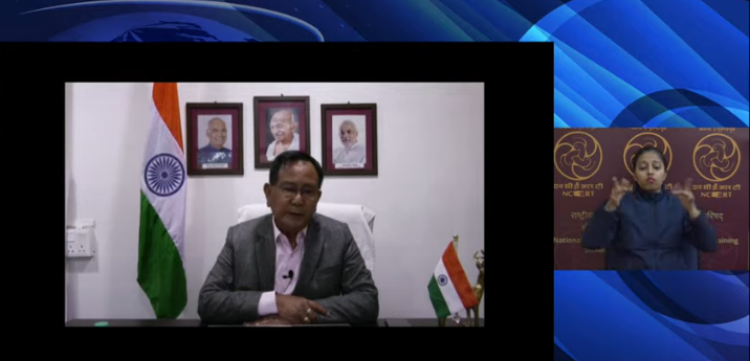Toy as teaching-learning resource has potential to transform pedagogy: MoS for Education
Shri Singh said that highlighted the role of toys in the cognitive development of children and igniting creativity and problem-solving skills in them.

- Country:
- India
Toy-based pedagogy is in alignment with the NEP 2020 and Prime Minister’s vision of “Vocal For Local" said Dr. Rajkumar Ranjan Singh, Minister of State for Education inaugural session of International Webinar on Toys and Games to Play, Make and Learn as a Chief Guest.
Shri Singh said that highlighted the role of toys in the cognitive development of children and igniting creativity and problem-solving skills in them. He stated that toy as a teaching-learning resource has potential to transform pedagogy, and that toy-based pedagogy can be easily used by the parents to make their children learn. Toys help in understanding the cultural heritage of our country, and at the same time, strengthen the psychomotor and emotional development of their personality, he added. He hoped that this international webinar will facilitate the journey of our nation towards self-sufficiency and will contribute to the economic development of the country.
Smt. Anita Karwal, Secretary, Department of School Education and Literacy, Ministry of Education thanked the people who have helped in bringing about the International Webinar. She mentioned the role of introducing toy-based pedagogy in the upcoming NCF as envisioned by the Prime Minister Shri Narendra Modi. She called attention to the importance of toys and games in the Indian tradition and raised concerns over games such as Shatranj or Chess that have been discovered in India and are now losing hold on Indian children. She presented the context of the NEP 2020, mentioning that it has provided for a definitive shift by focusing on play-based learning for the foundational and preparatory years. She also accentuated other aspects of the NEP 2020: usage of puzzles and games for the teaching of mathematics; rooting curriculum and pedagogy in the ethos of Indian culture, bringing out the unique potential of children, etc. She also mentioned the attempt of introducing toy-based pedagogy into the education system: the development of a “school readiness module” as mentioned in the NEP 2020 that is entirely based on activities and games and making of toys by children to develop their creativity, critical thinking, 21st century skills, and competencies.
She also shared details of the recent event – Hackathon – for designing and developing toys and games: more than 70% participants from schools, and most toys produced through this process were rooted in the Indian context.
In his Address, Director, NCERT, Prof. Sridhar Srivastava welcomed various Dignitaries, educationists, Scholars and Delegates attending the International Webinar and highlighted the importance of the International Webinar citing NEP 2020’s focus on toy-based and fun-based learning.
In her introductory address, Prof. Jyotsna Tiwari, Head, Department of Gender Studies, NCERT and coordinator of the webinar, highlighted that “toys” have always been an important part of the Indian culture, and raised concern over the increasing usage of plastic toys that have environmental repercussions. She underscored the importance of promoting rural and indigenous crafts, and boosting the indigenous toys industry and highlighted importance of toy-based pedagogy in helping children thinking and rethinking and reimagining the world. She mentioned the overwhelming response that the International Webinar received and shared its schedule.
Keynote Address was delivered by Shri Harshad P Shah, Vice Chancellor, Children’s University Gandhinagar. He provided perspective on Indian toy industry in the context of the global toy industry, mentioning that the former has a nominal share in the latter. He also mentioned that toys help in developing skills, logical thinking, receptive power and competencies in children. For example, toys help in developing coordination and cooperation among students, in understanding the so called “difficult subjects.” Dr. Shah shared the present practices and innovative initiatives in Children’s University such as Toy Innovation Lab, 3D Printing, Toy Library etc.
He also shared the future plans of the Children’s University and concluded by sharing four mediums for the development of children – songs, stories, games, toys.
The first technical session was on Toys in Different Civilizations and Cultures, the Session was Chaired by Dr.Sadchidanand Joshi, Member Secretary, Indra Gandhi National Centre of Arts, New Delhi and there were 5 papers which were presented on different themes on living tradition of toys and games taking examples from history and connecting it to the present day.
The second Technical Session on Learning Different Concepts with Toys: Toy based Pedagogy, was Chaired by Kim Insley, Associate Professor (Teaching) in the Department of Curriculum, Pedagogy and Assessment, Institute of Education, University College of London, and in the session, there were teacher and teacher educators who shared their experiences.
In the third technical session on Toy Design Education: Courses and Careers, Chaired Ravi Poovaiah, Professor, Industrial Design Centre, IIT Bombay, Mumbai, faculty members from different design institutes and one entrepreneur who shared their views on toy design education in the country and invited between synergies of different institutions to work for toy based pedagogy.
There were Hands on presentations showed through pre-recorded videos from Centre for Cultural Resources and Training, Ministry of Culture, Design Intervention at Benaras Toy Clusters through Innovative Toy Designs by Vikas Gupta, Reviving the Heritage of Chennapatna Toy Cluster through Design by Atul Dinesh, AnjuKauwrChazot, Director, Mahatma Gandhi International School, Toy Based Pedagogy presentation by KVS Teachers and Joyful Classrooms through Toy Based Pedagogy: Jyoti Gupta, Director DPS, Sahibabad and KR Mangalam School, New Delhi, highlighting practices around in the country of making toys and toy based pedagogy.
Mrs. L. S. Changsan, Joint Secretary, Ministry of Education, Prof. Sridhar Srivastava, Director, National Council of Educational Research and Training (NCERT), Prof. Amarendra Prasad Behera Joint Director, Central Institute of Educational Technology (CIET), Senior officials and officials from autonomous organizations of the Ministry of Education, and officers of NCERT also attended the webinar.
(With Inputs from PIB)
- READ MORE ON:
- Rajkumar Ranjan Singh
- Anita Karwal
- NCERT
- Jyotsna Tiwari










